This website uses cookies to improve your browsing experience and analyze the use of the website. Learn More

Reserve Your Spot with Confidence! Full Refunds with 24 Hrs Notice. Reschedule at any point, even after tour, if space allows!
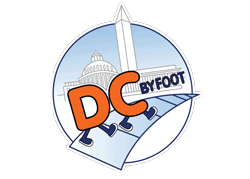
How to Tour the Supreme Court

This post covers how to attend a U.S. Supreme Court tour as well as courtroom lectures and oral arguments with tips on how to plan your visit and what you might see.
- Where is the Supreme Court
- Guided Tours + Exhibits
- Courtroom Lecture
- Attend a Supreme Court Case
- Visit the US Capitol and Library of Congress
- Other Things to Do in DC
HOW TO GET TO THE SUPREME COURT
The Supreme Court Building is located at 1 First Street St NE across the street from the US Capitol Building and the Library of Congress.
Use this link for directions to the Supreme Court .
Or let us take you here on one of our pay-what-you-like Capitol Hill Tours .
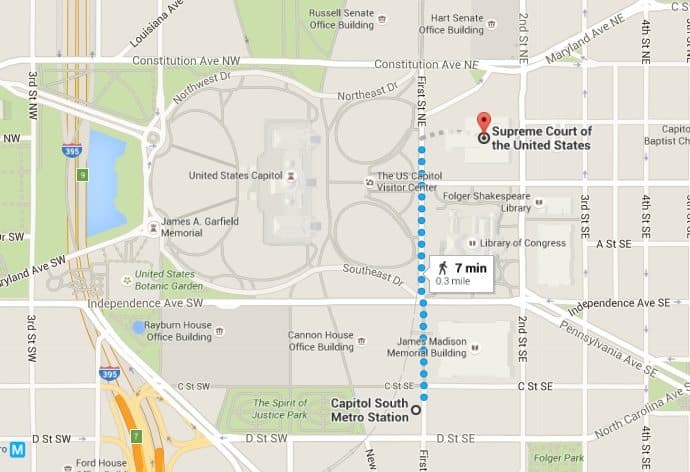
It is a 7 min walk from the Capitol South Station Metro ( Blue , Orange , Silver ). Exit the station and continue north on First Street for two blocks.
It is also about a 15-minute walk from Union Station ( Red ), which has a paid parking garage.
If you are new to DC's subway system, then read our guide on how to use the DC Metro system .
There are no parking facilities at the building. Street parking is very limited. You can reserve a space at nearby commercial garages through a service called SpotHero .
Supreme Court Hours:
The Supreme Court is open on weekdays 9 am - 3 pm , excluding Federal Holidays. The building is not open on the weekend.
Like most federal buildings, you will be required to enter through security. There are two doors on either side of the main steps on the plaza level to enter the building.
Prohibited items include weapons and other dangerous items.

SUPREME COURT TOURS + CURRENT EXHIBITS
The Supreme Court currently does not offer guided tours; visitors are encouraged to tour the building independently ( or on a tour with us !).
In reality, visitors are limited to only the public portions of the building, which are mostly the exhibits on the ground floor as well as the Main Hall on the 2nd floor.
There are several opportunities to visit the main courtroom (see below sections on attending a court lecture or to hear a case ).
Once through security, you will be on the ground floor.
Here you will find a 24-minute film that covers the history of the building, with interviews with the Chief Justice as well as Associate and former Justices.
It's on this floor where you will also find the current exhibitions .
- The Supreme Court Building: America's Temple of Justice
- Reading the Law: Legal Education in America
- Sandra Day O'Connor, First Woman on the Supreme Court
- The Power of Image: Charles Evans Hughes in Prints, Photographs, and Drawings
- Capturing Justice: Judicial Portraits by Augustus Saint-Gaudens
Supreme Court Building Tours
We are able to offer small group private tours that visit inside the Supreme Court on private versions of our Capitol Hill & Library of Congress Tour!
This 2 hour tour would tour inside the Supreme Court Building, inside the Library of Congress & end with tickets to tour inside the Capitol Building with their professional docents (this tour would be an additional 50 minutes to our 2 hour tour)
Our almost twice-a-day public version of this tour does not guarantee entrance into the Supreme Court (though sometimes we can visit inside based on security and opening). On private tours, we can schedule it to ensure we can go inside the Supreme Court.
Contact us to book a private Capitol Hill tour that enters the Supreme Court!
HOW TO ATTEND A SUPREME COURT LECTURE
Since this is a working federal building, you are limited as to where you can go on your self-guided tour.
The only way to visit the courtroom is by attending a docent lecture or attending a case.
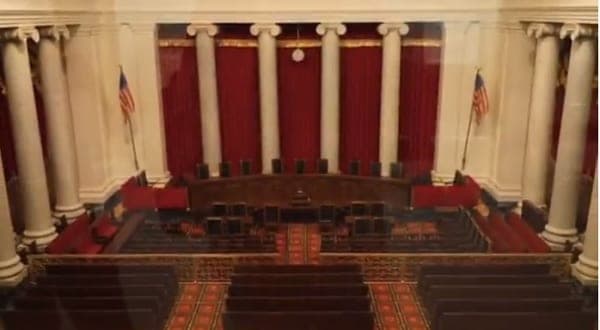
You can read about attending a case below but if you are visiting on a day that the court is not hearing a case, you can still have a seat in the courtroom and listen to the history of the court and the building.
30-minute courtroom lectures are held every half-hour from 9:30 am to 3:30 pm.
Seating is first-come, first-served, so during the busy spring and summer months, expect to get there early to wait in line.
For the most up-to-date information on when lectures are scheduled, visit the lecture calendar .
HOW TO ATTEND A SUPREME COURT ORAL ARGUMENT
While you can visit the Supreme Court courtroom as a visitor for lectures, cases are also open to the public.
Called Oral Arguments, these are the 1-hour long sessions where each side is allowed 30 minutes to argue before the court.
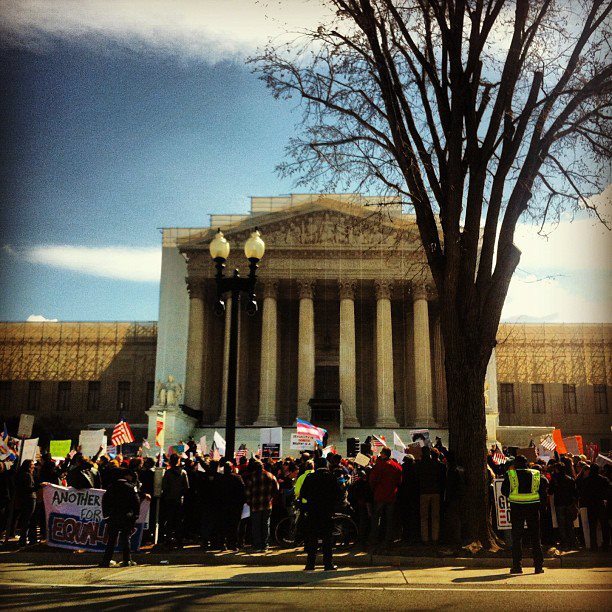
From the first Monday to October to Mid-April, cases are generally heard on Mondays, Tuesdays, and Wednesdays at 10 am and at 11 am, with additional afternoon sessions as needed.
There are two ways to attend a Supreme Court case.
You could either secure a seat and witness the entire Oral Arguments, or you can catch a quick 3-minute glimpse of the proceedings. (the 3-minute line is suspended still as of Feb 2024)
These two lines form on the plaza before each case.
For a landmark Supreme Court case, some people will line up days in advance to guarantee a spot. On a non-high-profile day, people arrive around 6 am-7 am.
Normally, only the first 50 are able to get in for the entire session.
Numbered tickets are given out prior to seating to allow you time to go to the restroom, cafeteria, and cloakroom.
If you don't get a seat , you can also do a walk-through where you stay for a few minutes and then move on. You can rotate through as many times as you'd like by getting back in line. (This is not an option as of Feb 2024. We hope it returns soon!)
You can also attend Bench Mondays (Mondays, 10 am, mid-May through June) to hear the court opinions and decisions.
These are about 15 - 30 minutes long, but can also form long lines for high-profile cases.
To see what cases are being argued, visit the Argument Calendar.
SUPREME COURT JUSTICES
How many justices are on the Supreme Court?
There are 9 Supreme Court Justices in total: 8 associate justices and one Chief Justice.
How do you become a Supreme Court Justice?
There are only two requirements to be a Supreme Court justice. It is not based on age, citizenship, or experience.
You must be nominated by the President and approved by Senate. It is a lifetime appointment that one holds until they retire.
Who is the Chief Justice of the Supreme Court?
The Supreme Court Chief Justice is a position appointed by the President, so it is not relevant to the length of time they serve on the court.
The current Supreme Court Justice is John Roberts.

Who are the current Supreme Court Justices?
- Clarence Thomas (1991)
- John Roberts (2005
- Samuel Alito (2006)
- Sonia Sotomeyer (2009)
- Elena Kagen (2010)
- Neil Gorsuch (2017)
- Brett Cavanaugh (2018)
- Amy Coney Barrett (2020)
- Ketanji Brown Jackson (2022)
VISIT THE U.S. CAPITOL BUILDING AND THE LIBRARY OF CONGRESS
Why not make a half-day of it and visit both the U.S. Capitol Building as well as the Thomas Jefferson Building of the Library of Congress?
Both are adjacent to the Supreme Court Building.
You could also have lunch at the Capitol Visitor Center.
For more information on visiting and touring both buildings, click on the links below.
- U.S. Capitol Building
- Library of Congress

Choose a Destination... I want them all PLUS general travel tips. Amsterdam Berlin Boston Charleston Chicago Dubai Lisbon London Los Angeles Miami Nashville New York City New Orleans Paris Philadelphia Prague Rome San Francisco Washington DC
About The Author

Canden Arciniega
North america, united kingdom & ireland, middle east & india, asia & oceania.
Tours and Tickets
All tickets are provided to constituents on a first-come, first-served basis. Due to the large number of visitors, please request them as early as possible in order to maximize your chances. Obtaining a White House tour can be very difficult. It is very important to follow the below guidelines for your application to be considered.
Supreme Court Tours: the public may visit and go inside the building, but this is up to the daily discretion of the Supreme Court. Tours of the first-floor public spaces are on a self-guided basis. Please visit the Supreme Court's Website to learn more about visiting the Court.
The following are policies determined by the White House for those requesting tours through Congressional Offices:
- Tours must be requested at least three months in advance.
- Tours are only available Tuesday through Thursday 7:30 a.m. to 11:30 a.m. and Fridays and Saturdays 7:30 a.m. to 1:30 p.m.
- Current Page 1
All tickets are provided to constituents on a first-come, first-served basis. Due to the large number of visitors, please request them as early as possible in order to maximize your chances.
Please choose three dates everyone in your party is available to tour the White House. Tours are available Tuesday through Thursday 7:30 a.m. to 11:00 a.m., and Friday and Saturday from 7:30 a.m. to 1:30 p.m. The tours are self-guided.
White House tours may be submitted up to 6 months in advance, but no later than 3 weeks before the requested tour date.
Each person in your tour party must submit security information to the White House via a link they provide.

This 360° virtual campus tour of The U.S. Supreme Court requires the Adobe Flash Player.
Please enable Javascript!

Tours and Tickets
Thank you for your interest in visiting our nation’s Capital. My team and I are excited to welcome you. Currently, the U.S. Capitol, White House, Library of Congress, Federal Bureau of Investigation (FBI), Bureau of Engraving and Printing (BEP), and Supreme Court have limited availability for tours. If you have additional questions, please call my office in Washington D.C. at (202) 225-8203.
All tickets are provided to my constituents on a first come, first serve basis. Due to a large demand from a growing number of visitors, we recommend placing requests three months in advance in order to maximize your chances of obtaining the tour.
Please see the guidance below for requesting tours:
U.S. Capitol Tours
At this time, our office is accepting tour requests on a limited basis. All tour information should be submitted through the form linked below. Please note that given the high number of requests, we may not be able to accommodate every request.
Please fill out this form to request a U.S. Capitol tour through our office.
White House Tours
The White House Visitors Office has a very limited number of tour tickets. Public tours are available 9:30 a.m. to 12:30 p.m. Tuesday through Saturday, excluding federal holidays unless otherwise noted.
Please fill out this form to request a White House tour through our office.
Library of Congress Timed Entry Reservations
Every Library of Congress visitor, regardless of age, must have a free time-entry pass to enter the Thomas Jefferson Building. Passes are available in 15-minute increments during operating hours. The Thomas Jefferson Building is open to visitors Tuesday through Saturday, 10 a.m. to 5 p.m. and until 8:30 p.m. on Thursdays.
Please note: the Library is closed for public visits on Sundays and Mondays. The Library releases time-entry passes 30 days in advance, and it is currently accepting reservations. Click here to view available time slots.
Supreme Court Tours
We are accepting constituent tour requests for a 25 minute program on the days the Court is not in session. For planning purposes, seating begins promptly at 12:30 p.m. in the Courtroom Lecture.
Please note: Check in for guests with reservations begins at 12:15 p.m . in the Great Hall. Latecomers cannot be accommodated.
Please fill out this form to request a Supreme Court Tour through our office.
We are accepting requests for the FBI Headquarters in Washington D.C. on a very limited basis.
Please note that tours may be scheduled up to five months in advance and no later than four weeks out. The tour is designed to last 60 to 90 minutes. To inquire about an FBI tour please call my D.C. office at (202) 225-8203.
Bureau of Engraving and Printing
We are accepting constituent tour requests for the Bureau of Engraving and Printing (BEP) on a very limited basis. Tour requests should be completed through the form below and at least three weeks in advance. Tours will be held Monday through Friday at 8:15 a.m. and 8:45 a.m., year-round.
Please fill out this form to request a BEP Tour through our office.
House Gallery Tours
When the House is in session, the Galleries open to visitors 30 minutes prior to the start of each session and remain open until adjournment.
When the House is not in session, the Galleries are open from 9:00 a.m. to 4:30 p.m., Monday through Friday. When the House is in session, the Galleries open to visitors 30 minutes prior to the start of each session and remain open until adjournment.
Gallery passes can be sent to constituents at an address inside Illinois’ 4th district or picked up in person in my office located at 1519 Longworth House Office Building, Washington, D.C., 20515. Please email me by clicking the contact tab at the top and select the “Email Me” function.
Please note: The House Galleries are closed on federal holidays and are subject to unplanned, temporary closures when the House is out of session.
Smithsonian Museums
While tours of the U.S. Capitol and White House are currently scheduled on a limited basis, Smithsonian museums are open. You may find out more information about timed-entry passes and hours for visiting the museums here .

U.S. Supreme Court Tours and Information

U.S. Supreme Court Tours
Please note that the Supreme Court is currently closed to the public.
What do you need to know? Building Hours & Entrances Monday – Friday (except Federal Holidays) 9 a.m. – 4:30 p.m. Closed on Saturday and Sunday Visitors may enter the building from the Plaza doors located on each side of the main steps. A wheelchair accessible ramp is located along Maryland Avenue on the left side of the building. All visitors must pass through security screening before entering the building. During the months of March – June, visitors should anticipate longer wait times to enter the building due to larger crowds visiting the Nation's Capital. Location and Directions The Supreme Court of the United States is located on First Street NE between East Capitol Street and Maryland Avenue, adjacent to the U.S. Capitol and the Library of Congress. View area map. By Metro (Subway): The closest Metro stops are: Capitol South (Orange, Blue and Silver Lines, 0.3 miles) Union Station (Red Line, 0.5 miles). By Metro Bus: The Circulator (Navy Yard Line), 96, 97, and A11 buses all stop in front of the Supreme Court Building. The 32, 34, 36, and 39 buses stop at First Street and Independence Avenue, a two block walk from the Building. Additional information on riding the Metro is available at the Washington Metropolitan Area Transit Authority. By Train: Amtrak, VRE, and MARC trains service Union Station, which is located approximately 0.5 miles from the Court. By Car: Street parking is extremely limited near the Supreme Court. The closest public parking garage is located at Union Station. Please note that the Supreme Court is not accessible by private bus or passenger van. Please see designated bus routes and restrictions. Cafeteria, Gift Shop, and Building Amenities A Cafeteria serving a variety of sandwiches, soups, salads, and beverages is open to the public from 7:30 a.m. until 4 p.m., Monday through Friday. A Gift Shop is located on the Ground Floor and is open from 9 a.m. until 4:25 p.m., Monday through Friday. The Gift Shop features extensive offerings of books and other instructive materials to enhance your understanding of the Court's history. Other offerings include educational games, learning aids, and gift items associated with the law and the Supreme Court. For your convenience, an ATM, public telephone (TTY/TDD), and vending machines are available on the Ground Floor. Public restrooms are located on the First and Ground Floors. Visitor Etiquette The Supreme Court is the highest court in the Nation for all cases and controversies arising under the Constitution or laws of the United States; therefore, visitors are asked to follow a few general guidelines. • Be prepared to pass through security screening at your point of entry. All items must be screened in x-ray machines and all visitors will be asked to pass through metal detectors. • Please tour the building quietly as working offices are adjacent to all public halls. Any visitors unable to maintain proper decorum will be asked to leave by the Supreme Court Police. • No photography or video recording is permitted inside the Courtroom. • Smoking is prohibited inside the building. • Consumption of food and beverages is permitted only in the Cafeteria and vending machine alcove. • Visitors may not touch portraits, busts, or other artifacts on exhibition. Accessibility Building Access and Parking Ramp access to the building is located along Maryland Avenue on the left side of the building. Limited handicap parking is also available along Maryland Avenue. Wheelchair Availability and Access A limited number of wheelchairs are available free of charge at your point of entry. Wheelchairs may be obtained from a Supreme Court Police Officer. Elevators are available throughout the building with access to all public areas. Assistive Listening Devices When Court is sitting, induction loop, FM and infra-red listening systems for the hearing impaired are available. Devices may be obtained from a Supreme Court Police Officer or Courtroom Attendant as you are being seated. Visitors' Film The film is accompanied by open captioning at each showing. TTY Telephone A wheelchair accessible, text telephone (TTY) is available in the vending machine alcove adjacent to the Maryland Avenue door. How do I get scheduled for a tour? Click here to vist the the Supreme Court website.
1616 Longworth House Office Building, Washington, DC 20515 Email Me (202) 225-8885
Tours and Tickets

All tickets are provided to constituents on a first-come, first-served basis. Due to the large number of visitors, please request them as early as possible in order to maximize your chances.
Supreme Court tours will be unavailable for the month of August.
Obtaining a White House tour can be very difficult. It is very important to follow the below guidelines for your application to be considered.
The following are policies determined by the White House for those requesting tours through Congressional Offices:
- Tours must be requested at least 8 weeks in advance.
- Tours are only available Tuesday through Thursday 7:30 a.m. to 11:30 a.m. and Fridays and Saturdays 7:30 a.m. to 1:30 p.m.
- Please note that our office will submit your request for White House tour, but cannot guarantee tour availability. Any questions or concerns regarding your White House tour request should be directed to the White House Visitor's Office by emailing [email protected] or by calling (202) 456-2322.
Obtaining a FBI Headquarters tour requires a Social Security Number (SSN) for any guests over 16 years old, to be requested after filling out the below form.
- Current Page 1
Please choose three dates everyone in your party is available to tour the White House. Tours are available Tuesday through Thursday 7:30 a.m. to 11:00 a.m., and Friday and Saturday from 7:30 a.m. to 1:30 p.m. The tours are self-guided.
White House tours may be submitted up to 6 months in advance, but no later than 8 weeks before the requested tour date.
Each person in your tour party must submit security information to the White House via a link they provide.
Please note that our office will submit your request for White House tour, but cannot guarantee tour availability. Any questions or concerns regarding your White House tour request should be directed to the White House Visitor's Office by emailing [email protected] or by calling (202) 456-2322.

Supreme Court appears skeptical of blanket immunity for a former president

Updated April 25, 2024 at 1:05 PM ET
A majority of the Supreme Court appeared skeptical of granting a president blanket immunity from prosecution for criminal acts . But it was unclear whether the court would act swiftly to resolve the case against former President Donald Trump, the presumptive Republican nominee for president.
The justices pushed lawyers for Trump and the special counsel prosecuting him over the limits of presidential immunity.
The question of presidential immunity from criminal prosecution after leaving office has never been decided by the Supreme Court, making Thursday's arguments at the Supreme Court genuinely historic.
John Sauer, Trump's attorney, said charging a president might make them more hesitant about making consequential decisions.
"If a president can be charged, put on trial, and imprisoned for his most consequential decisions, as soon as he leaves office, that looming threat will distort the president's decision making, precisely when bold and fearless action is most needed," he said.
But when pressed by Justice Amy Coney Barrett, a Trump appointee, Sauer acknowledged that many of the actions Trump is charged with were private in nature – not official.
Michael Dreeben, the lawyer for the special counsel, told the justices that blanket immunity would allow a president to commit "bribery, treason sedition, murder."
"The framers knew too well the dangers of a king who could do no wrong," he said.
A decision in the case is expected by the summer and could affect the timeline – and indeed the fate – of the federal prosecution against Trump.
Basics and background on the case
Specifically, Trump claims that the steps he took to block the certification of Joe Biden's election were part of his official duties and that he thus cannot be criminally prosecuted.
President Richard Nixon, while in office, was named an unindicted co-conspirator in the Watergate scandal, but he was not prosecuted then because the Justice Department concluded that under the Constitution, a sitting president could not be criminally prosecuted. Once Nixon resigned in 1974, however, and was no longer protected as a sitting president, he accepted a pardon from President Gerald Ford rather than face criminal charges.
Trump is making a far broader argument for immunity. He contends that he cannot be prosecuted — ever — for his "official acts" as president unless he is first impeached, convicted by the Senate and removed from office. He was impeached twice, but the Senate failed to muster the two-thirds vote needed to convict. So, were the Supreme Court to embrace Trump's argument, it would mean, given modern political realities, that he and future presidents would likely be immune from prosecution after leaving office.
Trump's definition of a protected official act is a broad one, as illustrated by an exchange between his lawyer, D. John Sauer, and Judge Florence Pan during arguments at the federal appeals court in Washington, D.C., earlier this year.
"Could a president order SEAL Team Six to assassinate a political rival?" Judge Pan asked, noting that an order given by the commander in chief to the military would be an official act.
Sauer replied that a former president could not be charged for giving such an order unless he had been "impeached and convicted first."
The three-judge appeals court panel , including two Democratic and one Republican appointee, ruled unanimously against Trump on the immunity question in February. Trump then appealed to the Supreme Court, though the former president will not be there today because he is required to be at his New York trial on charges that allege he falsified New York business records in order to conceal damaging information to influence the 2016 presidential election.
A test for the high court
Although there are four pending criminal indictments against Trump, only one was before the Supreme Court on Thursday: special counsel Jack Smith's case alleging that Trump knowingly and falsely sought to prevent Biden, the duly elected president, from taking office.
The high court case is more than a test for presidential immunity. It is also something of a test for the Supreme Court itself, on both substance and timing. After all, even if the court were to rule against Trump, if the justices drag their feet or send the case back to the trial court for significant further findings a Trump trial would be almost certainly impossible before the November election. And if he is elected for a second time, Trump could try to dismiss the case against him — or even pardon himself if he's convicted.
Trump lawyer William Scharf maintains that everything the former president is accused of doing was an official act, and that after leaving office, Trump cannot be prosecuted for those acts. "What President Trump was trying to do was investigate election fraud in the aftermath of the 2020 election," Scharf says.
Without presidential immunity, Scharf contends, "You end up in a scenario where presidents will be paralyzed by the fear of post-election criminal prosecutions, and the ability of the president to discharge his duties in a vigorous and effective way will be forever crippled."
Not so, counters Peter Keisler, a who served as a top Justice Department official in the George W. Bush administration: "You don't protect the presidency by immunizing somebody who tries to steal it."
Keisler has joined with several dozen high-ranking former GOP officeholders in filing a Supreme Court brief opposed to Trump's position .
"The text of the Constitution has no provision granting this immunity. No court decision has ever recognized this immunity. The historical understanding in our country has always been exactly the opposite," Keisler says. "Fundamentally, Trump's argument's just at war with the basic precept of our system that says that no one's above the law."
NYU law professor Trevor Morrison also pushes back at Trump's claim that his actions surrounding the 2020 election were part of a president's official duties. "The Constitution gives the president no role whatsoever in the administration of federal elections," says Morrison, adding that the states, Congress, even the vice president plays a role. But there is no mention in the Constitution of the president playing a role.
As for Trump's claim that no president can be prosecuted unless he has been first been impeached, convicted and removed from office, Morrison calls that argument "preposterous." Senate Republican Leader Mitch McConnell clearly rejected that idea when he voted against conviction in the second Trump impeachment.
"President Trump is still liable for everything he did while he was in office," McConnell said in a speech on the Senate floor. "We have a criminal justice system in this country ... and former presidents are not immune."
But Trump lawyer Scharf contends that if the Supreme Court doesn't put a stop to presidential liability now, "You'll have an endless cycle of recriminations and prosecutions at the end of every presidency." If Trump can be prosecuted after leaving office for what he did in seeking to void the election results, he says, then why not Biden for his handling of the border, Barack Obama for ordering drone strikes that resulted in American casualties, and George W. Bush for starting the Iraq War?
Trump rests much of his argument on a 1982 Supreme Court decision holding that presidents have absolute immunity from civil lawsuits for their official acts. But the court majority in that case emphasized that it was not deciding whether a similar immunity exists when it comes to criminal prosecutions.
The Trump briefs don't include any significant discussion of the Nixon tapes case
In that landmark decision, the court ordered Nixon to turn over to prosecutors specific White House tape recordings in which Nixon, then still president, plotted to cover up various campaign crimes, including the attempted bugging of the Democratic National Committee offices. When the White House tapes eventually became public, they led inexorably to a House committee vote to approve articles of impeachment and Nixon's ultimate resignation.
Still, Thursday's case is not a slam dunk for the prosecutors. NYU's professor Morrison says it's "significant" that three members of the court — Chief Justice John Roberts and Justices Elena Kagan and Brett Kavanaugh — previously served in the White House and were "responsible for attending to questions of presidential prerogatives and presidential power."
Kavanaugh has actually been on both sides of these issues. He played an important role in the special counsel's investigation of the sex scandal involving President Bill Clinton, but more importantly, he served first as as associate counsel and then for three years as staff secretary for President George W. Bush.
With that in mind, the brief filed by the group of former GOP officeholders has advanced something of a middle ground. It rejects presidential immunity for federal crimes undertaken by a president on or after Election Day in order to usurp the legitimate results of a democratic election.
On "the particular facts of the case, where the charge is that he unlawfully tried to seize the presidency after losing the election, it's sufficient to say there's certainly no presidential immunity ... for crimes like that," says Peter Keisler.
That would leave undecided tricky immunity questions involving presidential decisions centered on foreign relations or use of the military abroad.
Copyright 2024 NPR. To see more, visit https://www.npr.org.

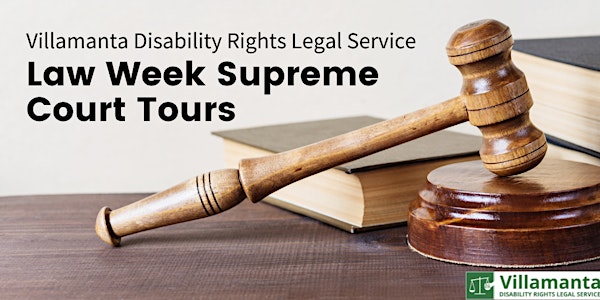
Law Week 2024: Supreme Court of Victoria Tour for Disability Advocates
Disability rights advocates with lived experience of disability are invited to join Villamanta at the Supreme Court of Victoria.
Date and time
Supreme Court of Victoria
About this event
Villamanta Disability Rights Legal Service invites disability advocates with lived experience of disability to join us for a day at the Supreme Court of Victoria.
You will have the opportunity to tour the Supreme Court and learn about accessibility at the Court.
After the tour, guest speakers from the Supreme Court’s disability liaison, facilities and security teams will discuss the resources and assistance which the Court provides for people with disabilities.
Finally, you will be able to attend a hearing to observe how the Court operates.
This event is an excellent opportunity to learn more about the Supreme Court of Victoria and discuss access to justice issues with Court staff.
There will be an opportunity to ask questions, so please come prepared with anything you would like to ask!
Please let us know if you have any questions or accessibility requirements.
Frequently asked questions
No, they do not.
We totally understand. Two Villamanta staff members will be attending to make sure everything runs smoothly, and that everyone can participate in a way that is comfortable for them. Just let us know you'd like a bit of extra support, and we will be in contact.
- Australia Events
- Victoria Events
- Things to do in Melbourne, Australia
Organized by
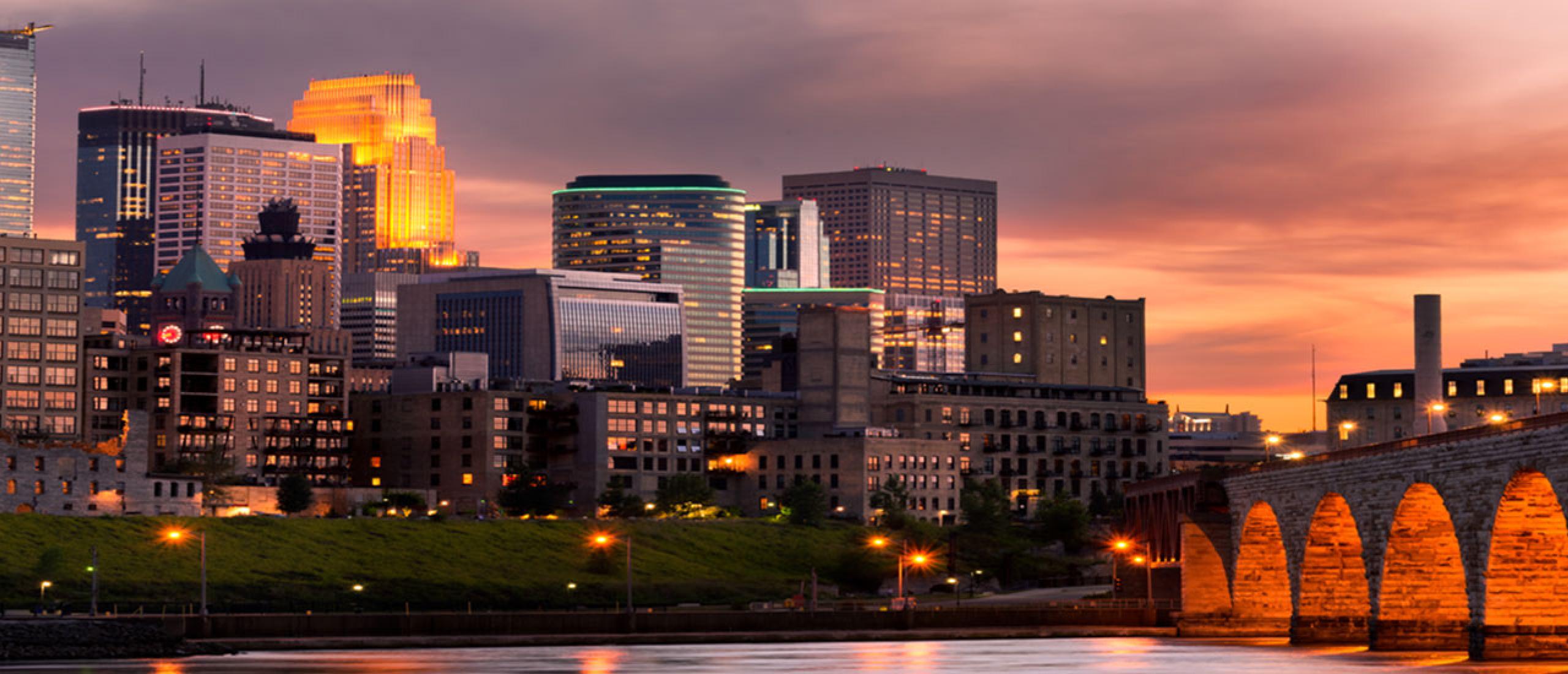
Reps.Omar, Raskin, and Stansbury Push For Supreme Court Accountability With New Legislation
Judicial ethics enforcement act ensures inspector general for scotus.
WASHINGTON, DC — U.S. Representatives Ilhan Omar (MN-05), Jamie Raskin (MD-08), Melanie Stansbury (NM-01), and Senator Richard Blumenthal (CT) introduced the Judicial Ethics Enforcement Act of 2024 creating an Office of the Inspector General within the judicial branch and empowering the inspector general to conduct investigations of alleged violations of the Code of Conduct for Justices of the Supreme Court of the United States.
“For far too long, the highest court in our land has operated without true oversight," said Rep. Ilhan Omar. "The American people deserve to have faith that the decisions being made by our judicial system are guided by the principles of fairness and the rule of law – not partisan politics or personal conflicts of interest. Our democracy depends on the integrity and impartiality of our judicial system. But in recent years, we've seen growing public mistrust as the Court has become increasingly ideological. This bill sends a clear message that the American people deserve transparency, accountability, and a Supreme Court that upholds the highest standards of ethical conduct.”
“Our people are in uproar over the money that billionaires and big corporations are spending to influence justices on the Supreme Court,” said Rep. Raskin. “Well-funded right-wing networks have poured money into reshaping the Court in their image and for their own purposes. Despite this flagrantly elitist and antidemocratic campaign, the highest court in the land continues to have the lowest ethical standards. This legislation takes a crucial step towards rebuilding the Supreme Court’s tarnished reputation and restoring its lost credibility with the American people. I'm grateful to my colleagues Representatives Stansbury and Omar for working with me to forward this critical effort to establish an Office of the Inspector General within the judicial branch. Thank you to Senator Blumenthal for leading the introduction of companion legislation in the Senate.”
“Like every other federal entity, the Judiciary needs an Inspector General to deter and investigate internal wrongdoing — and restore public trust. After years of plummeting public confidence, the Courts need a watchdog to do prompt, impartial investigations of alleged conflicts of interest, improper benefits or other potential wrongdoing. Any ethics rules or code of conduct requires public accountability — otherwise it’s dead letter — as the Inspector General would provide,” said Sen. Blumenthal.
“Americans have lost trust in the Supreme Court,” said Rep. Stansbury. “Strong judicial ethics are critical to a free and democratic society. Safeguarding these fundamentals is necessary to ensuring we restore faith in our democracy and our institutions, and an Inspector General will hold the Justices internally accountable to the highest ethical standards to protect the Court from special interest groups looking to strip Americans of their rights to protect their personal agendas.”
Specifically, the Judicial Ethics Enforcement Act of 2024 would:
- Create an Office of the Inspector General within the Judicial branch.
- Authorize the Inspector General to conduct investigations of alleged violations of the Code of Conduct for Justices of the Supreme Court of the United States.
- Authorize the powers and limitations of the Office of the Inspector General when investigating the Court.
- Structure the duties of the Inspector General which would include conducting and supervising audits and investigations, preventing and detecting waste, fraud, and abuse; and recommending changes in laws or regulations relating to the code of conduct adopted by the Supreme Court.
- Require the Inspector General to make prompt reports to the Chief Justice and to Congress on matters that may require action by the Chief Justice or Congress.
- Require the Inspector General to report expeditiously to the Attorney General whenever the Inspector General has reasonable grounds to believe there has been a violation of Federal criminal law.
- Require the Inspector General to provide an annual report to both the House of Representatives and the Senate on the results of their investigations.
- Set appointments, term limits and removals of the inspector general.
- Provide protection for whistleblowers.
Statements of support from organizations endorsing the legislation are below:
“The Supreme Court’s ongoing corruption crisis has undermined its credibility and caused public trust to plummet to record lows. Since the conflicted justices refuse to cut off their cozy relationships with their billionaire buddies, the crisis requires an urgent solution. The Judicial Ethics Enforcement Act is just that,” said Accountable.US President Caroline Ciccone. “Thanks to the strong leadership of Representatives Stansbury, Raskin, Omar, Hank Johnson, and several other original cosponsors, we’re one step closer to ensuring our high court serves everyday Americans — not justices’ wealthy pals and special interests.”
“CPD is proud to endorse the Judicial Ethics Enforcement Act and fight for the checks and balances this nation was founded upon,” said CPD Co-Executive Directors, Analilia Mejia and DaMareo Cooper. “Today’s Supreme Court is controlled by ultraconservative justices buried deep in the pockets of special interest groups committed to stripping our freedoms. It’s high time we held the Court to an ethics code that forces them to act with the fairness their job demands.”
“The Supreme Court is in a state of crisis—between the corruption permeating its halls and the attacks on our fundamental freedoms, Americans have lost faith in our highest court,” said Tiffany Muller, President of End Citizens United // Let America Vote Action Fund. “The Judicial Ethics Enforcement Act of 2024 is a necessary step in holding the court accountable and restoring Americans’ confidence in the institution. We thank Congresswoman Stansbury and Senator Blumenthal for their ongoing leadership in the fight to reform the Supreme Court.”
Expedia Rewards is now One Key™
Visit lyubertsy, check lyubertsy hotel availability, popular places to visit.
You can learn about the history of Moscow with a trip to Red Square. Experience the area's fascinating museums and acclaimed theater scene.
- Moscow Kremlin
Visit the most iconic square in Russia, which is bordered by many of the city’s most famous landmarks.
- St. Basil's Cathedral
Think of Russia and you probably picture this iconic building, whose onion-shaped domes overlook the Moscow skyline.
- Bolshoi Theatre
A centerpiece of the Russian arts scene, this theater’s magnificent auditorium and top-tier productions will impress even the most jaded theatergoer.
- Lenin's Mausoleum
Mourners and curious visitors stream to the grave to see the embalmed Vladimir Lenin, the famous revolutionary and one-time leader of the Soviet Union.
- Exhibition of Achievements of National Economy
Learn about the events happening at Exhibition of Achievements of National Economy during your trip to Moscow. Wander the parks and gardens while you're in the area.
- Cities near Lyubertsy
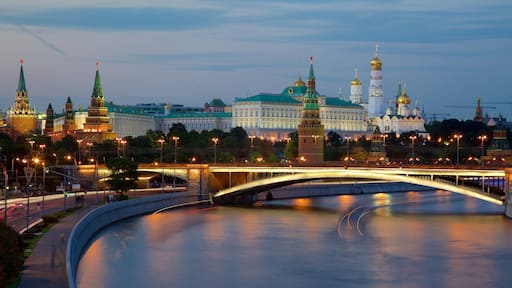
Dzerzhinskiy
- Places of interest
- Moscow City
- State Historical Museum
- Armoury Chamber
- Arbat Street
- Moscow State University
- Pushkin Museum of Fine Arts
- State Tretyakov Gallery
- Ministry of Foreign Affairs
- Cathedral of Christ the Savior
- Luzhniki Stadium
- Victory Park
- New Tretyakov Gallery - Museum of Modern Art
- Ostankino TV Tower
- Minin and Pozharsky Monument
- Kolomenskoye Church of the Ascension
- Sparrow Hills
- Russian White House
- Novodevichy Convent
- Triumphal Arch

COMMENTS
The Supreme Court of the United States is located on First Street NE between East Capitol Street and Maryland Avenue, adjacent to the U.S. Capitol and the Library of Congress. View area map. ... Please tour the building quietly as working offices are adjacent to all public halls. Any visitors unable to maintain proper decorum will be asked to ...
The Supreme Court Building, majestic in size and rich in ornamentation, serves as both home to the nation's highest Court and the manifest symbol of its importance as a coequal, independent branch of government. The Supreme Court Building is open to the public Monday - Friday from 9 a.m. to 3 p.m. It is closed on weekends and all federal ...
The Supreme Court is open to the public Monday through Friday, from 9 a.m. to 3 p.m., excluding federal holidays. Visitors should be aware that the business of the Court may affect public access to the building and visitor programs. Please check Today at the Court on the homepage for the Court's daily calendar.
It surprises many visitors to learn the Supreme Court was not provided with its own building until 1935, the 146th year of its existence. Until then, the Court had sat in various locations, including in the U.S. Capitol. Finally in 1929, Chief Justice William Howard Taft, who had been President of the United States from 1909 to 1913, persuaded ...
53. Get personalized attention and enjoy a flexible itinerary on this walking tour of Washington, D.C. Visit the highlights and landmarks of the nation's capital, such as the Supreme Court, the Capitol Building, the Main Reading Room of Library of Congress, and others. 2 hours 30 minutes. Free Cancellation.
The Supreme Court Building is located at 1 First Street St NE across the street from the US Capitol Building and the Library of Congress. Use this link for directions to the Supreme Court . Or let us take you here on one of our pay-what-you-like Capitol Hill Tours. It is a 7 min walk from the Capitol South Station Metro ( Blue, Orange, Silver ).
Please visit the Supreme Court's Website to learn more about visiting the Court. The following are policies determined by the White House for those requesting tours through Congressional Offices: Tours must be requested at least three months in advance. Tours are only available Tuesday through Thursday 7:30 a.m. to 11:30 a.m. and Fridays and ...
United States Supreme Court. The Supreme Court is open to the public for self-guided tours every Monday through Friday from 9:00AM- 3:00PM on days when the Court is not in session and hearing oral arguments. Advanced reservations and tickets are not required.
per adult (price varies by group size) Capitol Hill, Supreme Court and Library of Congress ExclusiveTour. 18. Recommended. Historical Tours. from. $73.14. per adult (price varies by group size) Washington DC Hop-On Hop-off Trolley Tour with 15 Stops.
Visitor Information. Although the Supreme Court does not offer guided walking tours, visitors are encouraged to tour public portions of the building on a self-guided basis and take advantage of a variety of educational programs, including Courtroom Lectures and court-related Exhibitions. In addition to the Courtroom, portions of the first and ...
Take a virtual tour of United States Supreme Court. This 360° Virtual Tour gives you a detailed panoramic look at the historic courtroom, judges' chambers, conference rooms, libraries and halls.
Supreme Court Tours. We are accepting constituent tour requests for a 25 minute program on the days the Court is not in session. For planning purposes, seating begins promptly at 12:30 p.m. in the Courtroom Lecture. Please note: Check in for guests with reservations begins at 12:15 p.m. in the Great Hall. Latecomers cannot be accommodated.
The Court is the highest tribunal in the Nation for all cases and controversies arising under the Constitution or the laws of the United States. As the final arbiter of the law, the Court is charged with ensuring the American people the promise of equal justice under law and, thereby, also functions as guardian and interpreter of the Constitution.
All tickets are provided to constituents on a first-come, first-served basis. Due to the large number of visitors, please request them as early as possible in order to maximize your chances. Supreme Court tours will be unavailable for the month of August. Obtaining a White House tour can be very difficult.
The Supreme Court of Georgia is available for public group tours on Tuesdays and Thursdays from 10 a.m. until 2 p.m. and on Wednesdays from 10 a.m. until noon. To schedule your tour, please review the available dates and times in the calendar below: The Supreme Court of
Please CLICK HERE to learn more about our tour offerings or to reserve your group tour. **On January 1, 2024, the Supreme Court of Georgia implemented comprehensive revisions of its rules. ... **On January 1, 2024, the Supreme Court of Georgia implemented comprehensive revisions of its rules.
Updated April 25, 2024 at 1:05 PM ET. A majority of the Supreme Court appeared skeptical of granting a president blanket immunity from prosecution for criminal acts.But it was unclear whether the court would act swiftly to resolve the case against former President Donald Trump, the presumptive Republican nominee for president.
Eventbrite - Villamanta Disability Rights Legal Service Inc presents Law Week 2024: Supreme Court of Victoria Tour for Disability Advocates - Friday, May 31, 2024 at Supreme Court of Victoria, Melbourne, VIC. Find event and ticket information.
WASHINGTON, DC — U.S. Representatives Ilhan Omar (MN-05), Jamie Raskin (MD-08), Melanie Stansbury (NM-01), and Senator Richard Blumenthal (CT) introduced the Judicial Ethics Enforcement Act of 2024 creating an Office of the Inspector General within the judicial branch and empowering the inspector general to conduct investigations of alleged violations of the Code of Conduct for Justices of ...
The Supreme Court wrestled Monday for more than two and a half hours with the issue of ticketing homeless people is a "cruel and unusual" punishment that violates the Eighth Amendment.
Thursday's headlines: The Supreme Court will hear a case on whether a former president can be criminally prosecuted for actions taken in office; campus protesters were met by police at USC and UT ...
5 /5 (455 reviews) You can learn about the history of Moscow with a trip to Red Square. Experience the area's acclaimed theater scene and fascinating museums.
The Supreme Court is set to hear oral arguments Monday over a challenge to a law letting cities fine homeless people, potentially radically changing the lives of the hundreds of thousands without h…
"Americans have lost trust in the Supreme Court," said Rep. Stansbury. "Strong j udicial ethics are critical to a free and democratic society. S afeguarding these fundamentals is necessary to ensuring we restore faith in our democracy and our institutions, and an Inspector General will hold the Justices internally accountable to the highest ethical standards to protect the Court from ...
Private Sightseeing Tours in Moscow: Check out 6 reviews and photos of Viator's Private Moscow Metro Tour
Moscow has some of the most well-decorated metro stations in the world but visitors don't always know which are the best to see. This guided tour takes you to the city's most opulent stations, decorated in styles ranging from neoclassicism to art deco and featuring chandeliers and frescoes, and also provides a history of (and guidance on how to use) the Moscow metro system.
Taylor Swift poses on the red carpet as she attends the 66th Annual Grammy Awards in Los Angeles, California, U.S., February 4, 2024. REUTERS/Mario Anzuoni/File Photo Purchase Licensing Rights